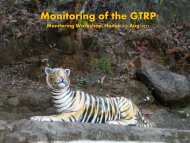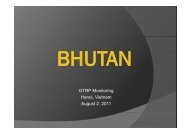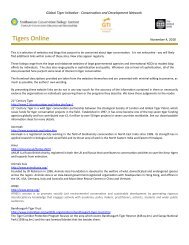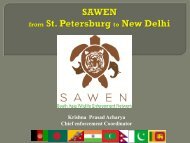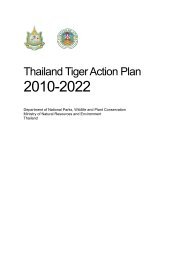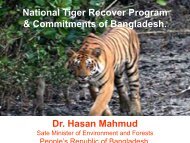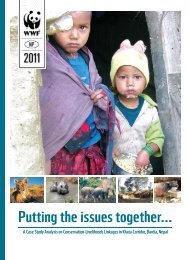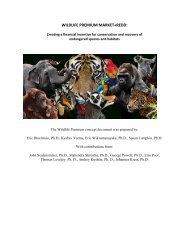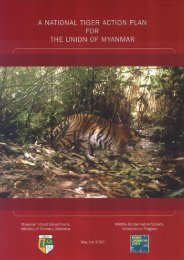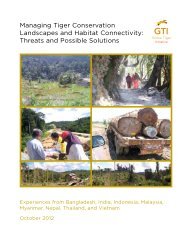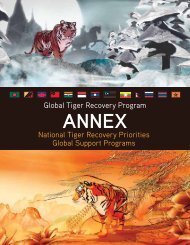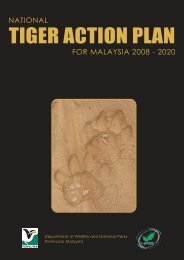Download - Global Tiger Initiative
Download - Global Tiger Initiative
Download - Global Tiger Initiative
You also want an ePaper? Increase the reach of your titles
YUMPU automatically turns print PDFs into web optimized ePapers that Google loves.
aised for re-investment into wildlife conservation. The primary goal of such programmes<br />
should be the conservation of wildlife and habitats and this is achieved through the devolution<br />
of any benefits to the local community (Shackleton, 2001).<br />
The longest running community-based trophy-hunting programme in Pakistan is the Torghar<br />
Conservation Project (TCP), established in 1986 on tribal lands in the Torghar range of northwest<br />
Balochistan (Johnson, 1997, Shackleton, 2001). This project was initiated in response to<br />
concerns about the status of the Afghan Urial Ovis orientalis cycloceros and Markhor Capra<br />
falconeri jerdoni populations in the Torghar Hills. It aims to stop poaching and uses the revenue<br />
from the sale of trophy hunts to hire local people as wildlife guards if they agree to stop<br />
poaching (Shackleton, 2001). In 1994, TCP for was formalized as a registered NGO - the<br />
Society for Torghar Environmental Protection (STEP). In its first 10 years it generated about<br />
USD460 000 from hunts of 14 markhors and 20 urials (Johnson, 1997). In 2001, STEP<br />
employed 55 local game guards from several sub-tribes. The positions are distributed equitably<br />
across the sub-tribes, which select the game guards, and this has the advantage that, not only are<br />
the efforts of the game guard himself recruited against poachers, but also those of most of the<br />
male members of his sub-tribe (Shackleton, 2001).<br />
Balistan, Pakistan: Livestock insurance schemes<br />
Project Snow Leopard is a community-based approach that aims to resolve the conflict between<br />
local farmers and Snow Leopards in northern Pakistan. The project was initiated in 1999 with<br />
a small grant from the Whitley Foundation and is implemented in the community of Skoyo, in<br />
the Baltistan region of northern Pakistan. The scheme works by combining an insurance system<br />
with eco-tourism: farmers pay insurance premiums per head of livestock into a fund managed<br />
and administered by the community of Skoyo. The community and Project Snow Leopard staff<br />
administer the income so generated for Snow Leopard-based eco-toursim, which is likewise<br />
jointly organized. The concept behind the scheme is to provide farmers with incentives to<br />
change their behaviour to protect Snow Leopards. Compensation in case of livestock losses to<br />
Snow Leopards aims to remove the incentive for farmers to kill the cats, while additional<br />
income through eco-tourism provides farmers with a positive incentive to conserve the local<br />
Snow Leopard populations. Through an emphasis on community participation and the<br />
integration of local institutions in the management and operation of the scheme, the possibilities<br />
of fraud are reduced. This feeling of ownership of the scheme is an important component.<br />
Because the villagers see their collective pool of money, generated from “their” common<br />
resource - the Snow Leopard, a false claim by one individual would mean defrauding the whole<br />
community.<br />
Since the start of the scheme, seven claims have been filed. They have all been approved and<br />
compensation has been paid out. Surveys in the area show that the Snow Leopard population<br />
in the area is stable and perhaps increasing. There are plans to add corral improvements (with<br />
barbed wire, wire mesh and iron posts) as a new component to the project and it is hoped that<br />
this will substantially reduce livestock depredation rates, thus decreasing the number of claims<br />
made to the insurance scheme. The money saved in this way can be invested in infrastructure<br />
in and around the villages, to facilitate eco-tourism (Hussain , 2002).<br />
A similar scheme was set up by WWF Russia in the Tyva Republic of the Russian Federation,<br />
in 2000.<br />
FADING FOOTPRINTS: the killing and trade of Snow Leopards 51




